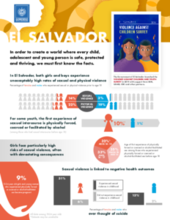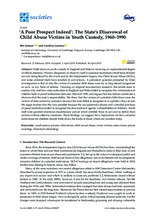Displaying 311 - 320 of 1070
This fact sheet presents an overview of the data found in El Salvador’s Violence Against Children Survey.
In this chapter from the book Re-Visioning Public Health Approaches for Protecting Children, the authors critically examine the practical and organisational issues as well as the ideational and procedural ones that challenge policy makers, leaders and those delivering services as they attempt to re-focus child protection service delivery toward earlier intervention and prevention within a public health framework.
This paper presents an overview of ChildHub, a peer learning and capacity-building network for child protection professionals initially developed and deployed in South-East Europe, and outlines a proposal for contextualizing ChildHub to Africa and South Asia.
A pre-post design with 6–13-month follow-up assessed the feasibility and acceptability of a home-visiting intervention to promote early childhood development, improve parenting and shared decision-making, and reduce violence in impoverished Rwandan households.
This article initiates the conversation on the conceptualisation of child neglect in Namibia, reporting findings from a small study undertaken in 2017.
This study examined associations between early developmental vulnerabilities and (1) the highest level of child protection response (where out-of-home care was deemed the highest response among other types of reports/responses), and (2) the developmental timing of the first child protection report.
This study utilizes a quasi-experimental propensity score matching design to assess the causal impact on child welfare outcomes when parents facing an abuse or neglect case in the New York City Family Court were provided interdisciplinary law office representation as opposed to a standard panel attorney.
Drawing on original documentary research, this article aims to explain why and how state authorities in England and Wales failed to recognise the victimisation of children held in penal institutions between 1960 and 1990, and argues that this failure constitutes a disavowal of the state’s responsibility.
This video provides a short summary of the INSPIRE objective and goals, strategies included, measures to be implemented and good practices develop across the globe.
This short webinar delivered by Dr Alex Butchart, WHO, and Ms Sabine Rakotomalala, Global Partnership to End Violence Against Children, is an introduction to the evidence-based strategies and interventions gathered in INSPIRE, a technical package to reduce and prevent violence against children.


